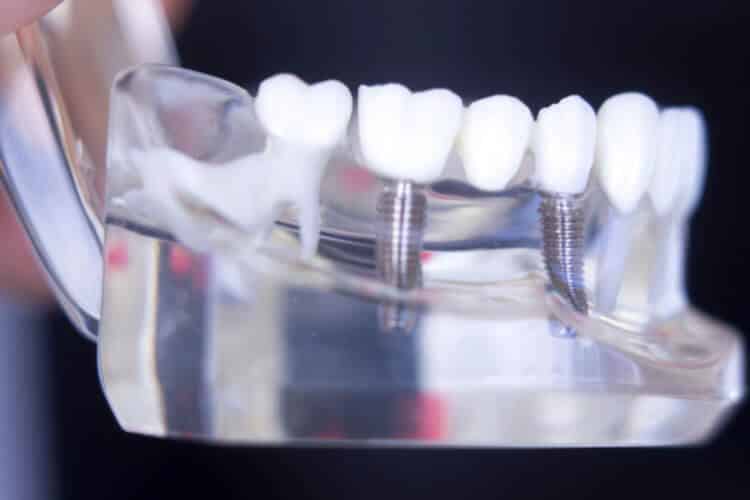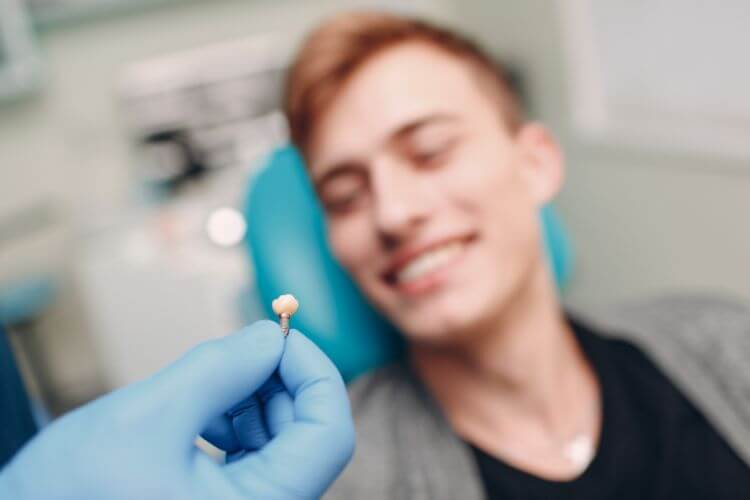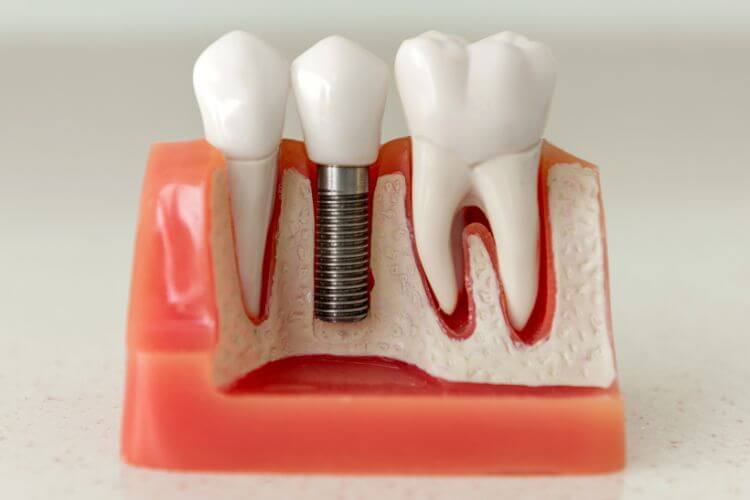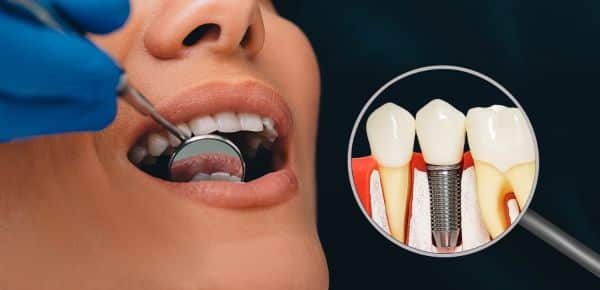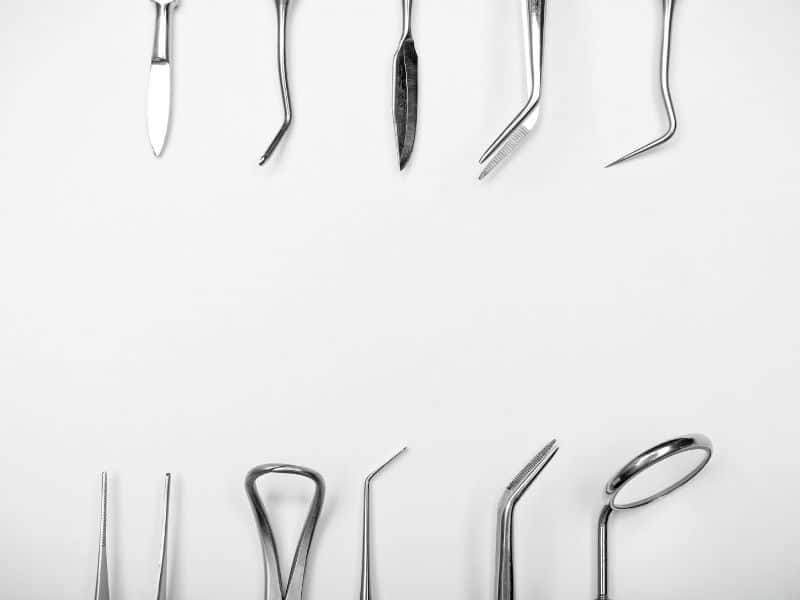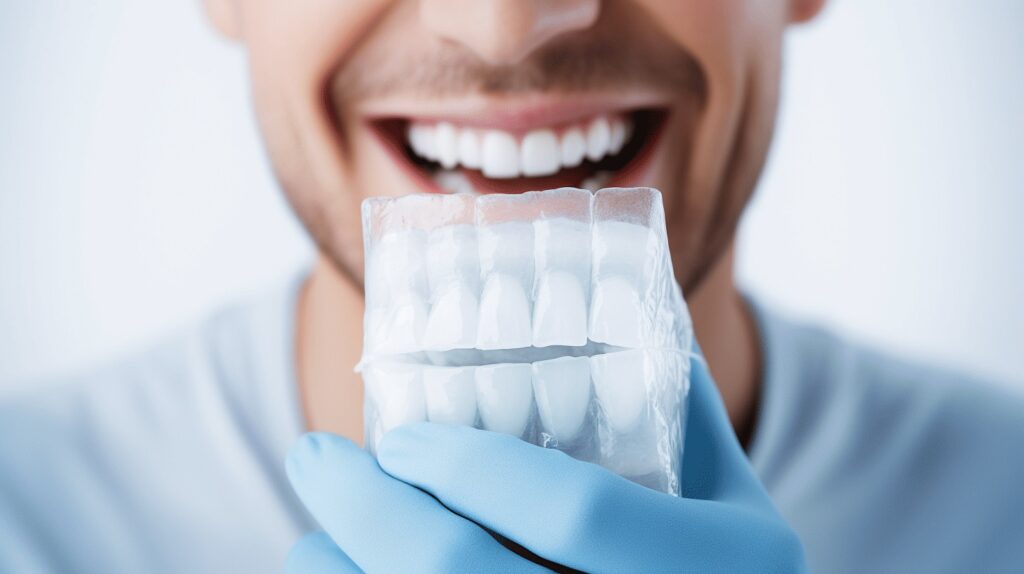Welcome! 😊 As health-conscious individuals who value our smiles, we would like to discuss how we can maintain those shiny dental implants Caring For Dental Implants.
Dental implants are an impressive solution for tooth replacement, but they require careful attention and regular maintenance to ensure they last and continue to serve their intended purpose. Just like your natural teeth, they need daily care. An implant that is not properly cared for can lead to gum disease, infection, discomfort, and, in extreme cases, implant failure.
In this article, we’ll outline practical tips and tricks to get the most out of your dental implants. We will discuss the importance of good oral hygiene, effective use of antimicrobial mouthwash, following dentist’s recommendations, advanced cleaning tools, regular dental check-ups, and how to prevent gum diseases.
We’ll also share insights into the latest research and guidelines on dental implant care. So, stay tuned and, together, let’s give your dental implants the care they deserve. 👍
Table of Contents
Practicing Good Oral Hygiene
Let’s face it, we all know the drill (both metaphorically and unfortunately, sometimes literally!). To ensure our pearly whites stay in tip-top shape, it is essential we prioritize good oral hygiene. Maintaining a set of healthy, glistening teeth demands more than just the odd intermittent brush. There are daily routines everyone can adopt to promote excellent dental health. Today, we will walk you through the best practices recommended by dental experts.
Brush Twice a Day 🦷
You’ve probably heard this a thousand times – Brush your teeth twice a day! It’s a mantra every dentist swears by. But did you know this is not just about keeping your breath fresh and warding off the dreaded tooth decay? Regular brushing assists in preventing diseases that could potentially harm other parts of your body, like your heart 🖤.
It’s worthy to mention that even the simple act of brushing stands on a couple of prerequisites to maximize its effectiveness. Foremost, select a soft-bristle toothbrush that is delicate on your gums, preventing any unnecessary irritation. Also, apply a non-abrasive toothpaste, especially when dealing with dental implants. This combination ensures a thorough, yet gentle cleanse for your mouth.
Regular Flossing 🧵
Another critical aspect of excellent oral hygiene is challenge accepted, floss every day! Although some think it might be optional, flossing complements tooth brushing by reaching deeper corners where a regular toothbrush might not impact. This helps eradicate plaque, food particles, and prevent gum diseases. So next time, think twice before skipping the floss out of your dental routine!
Remember, maintaining a consistent routine of brushing and flossing doesn’t just gift you a movie-star smile 😁, it also contributes significantly to your overall wellbeing. So, stay committed, and give your teeth the attention they deserve. After all, a smile is the prettiest thing you can wear!
Use of Antimicrobial or Antibacterial Mouthwash
We’ve been on a quest for perfect oral health for decades, and part of that journey often includes looking beyond brushing and flossing as the primary defenders of our pearly whites. But have you ever considered incorporating an antimicrobial or antibacterial mouthwash into your daily oral care routine? While it might sound like a mouthful (pun totally intended! 😁), it’s a simple change that can make a world of difference.
Antimicrobial mouthwashes, or as some prefer to call them, antibacterial mouthwashes, play a crucial role in maintaining your oral health. Yes, they are here to bolster your dental care arsenal, with the ultimate aim of giving you that fresh, confident smile. They don’t just make your breath smell minty fresh. They can help control or reduce oral bacteria, fight plaque, prevent gum diseases and even whiten your teeth.
- Control or Reduce Oral Bacteria: Our mouth is home to numerous bacteria. While some are harmless, others can attack the enamel and cause tooth decay. A good antibacterial mouthwash contains ingredients like chlorhexidine, cetylpyridinium chloride, and essential oils which have been found to reduce these harmful bacteria.
- Fight Plaque: Regular use of antibacterial mouthwash can help control the formation of dental plaque – the sticky, colorless film of bacteria that can lead to tooth decay and gum disease.
- Prevent Gum Diseases: The ingredients in these mouthwashes have been found to be effective in preventing gingivitis, an early form of gum disease.
- Teeth Whitening: Some mouthwashes also contain whitening agents that can help to remove stains and brighten your smile.
Caring For Dental Implants
So next time when you\’re brushing and flossing, remember, an antimicrobial or antibacterial mouthwash can be a fantastic addition to your daily oral care routine. It doesn’t just leave your breath smelling great, but it really goes the extra mile in ensuring you maintain optimum oral health. As they say – the fresher the breath, the brighter the smile! 😁 But remember, mouthwash isn’t a replacement for brushing and flossing – think of it as your secret weapon in the battle for a healthy, happy mouth!
Following Dentist Recommendations
No matter which dental procedure you’re going for, adhering to your dentist’s advice can ease your journey to a healthy smile. Understanding and following their recommendations can not only drastically improve your overall oral health, but also potentially help you avoid further complications. When it comes to dental implant procedures, this is especially important. So, what should you focus on before and after a dental implant procedure?
Before Dental Implant Procedure – Caring For Dental Implants
Embarking on your dental implant journey soon? Prepping your dental health for the implant procedure is vital. Here are a few tips to keep in mind.
- Maintain regular oral hygiene: Brushing twice a day, flossing daily, and regular rinsing with antibacterial mouthwash is essential to keep cavities at bay. Your dentist won’t be able to perform the implant surgery if you have gum disease or cavities.
- Follow a balanced diet: Eating foods rich in vitamin C and D, calcium, and phosphorus will help build strong teeth and gums, laying a solid foundation for your dental implant.
- Avoid Tobacco: Smoking or chewing tobacco can lead to multiple dental issues, including gum disease and oral cancer. Ensure to quit tobacco at least a week before your surgery date.
- Stay hydrated: Drink at least eight glasses of water each day to keep your mouth moist and help wash away bacteria and food particles.
After Dental Implant Procedure
Post-implant care is just as essential to ensuring the success of the procedure. Here’s how you can care for your new teeth.
- Regular oral hygiene: Continue brushing and flossing, but be gentle around the surgical site to prevent irritation or infection.
- Rinse with Salt Water: Rinsing your mouth with lukewarm saltwater can expedite healing and keep infections at bay post-surgery.
- Eat Soft Foods: For the first few days following the procedure, your mouth will be sensitive. Opt for soft foods to avoid any discomfort.
- Quit Smoking: If you haven’t quit before the procedure, it’s important to do so now, as it can interfere with the body’s healing process.
Should you have any doubts or concerns, the proper professional course of action is to discuss them with your dentist. Get all your Dental Implants Questions Answered even before you embark on your journey. Your dental health influences your overall health, and keeping it at its best is always worth the effort. By embracing these habits, you are likely to have a smoother and more successful dental implant experience. After all, your rewarding smile is our ultimate objective!
Using Advanced Cleaning Tools – Caring For Dental Implants
In today’s fast-paced world, take a moment when you’re winding down (or winding up!) your day to prioritize dental hygiene. It’s something that we so often overlook but plays a pivotal role in our overall health. Let’s dive deeper into some advanced cleaning tools you should consider incorporating into your daily routine: the water flosser and interdental brushes.
Water Flosser – Caring For Dental Implants
If you’re not already using a water flosser, it might just be time to add this nifty gadget to your oral hygiene regimen. 😁 The water flosser, sometimes referred to as oral irrigator, offers a high-pressure water jet that effectively removes plaque and food particles between teeth and below the gumline. Sounds like a high tech power-washer, but for your teeth!
Some compelling reasons to consider a water flosser include:
- Gentler on gums: Have you ever flossed too aggressively and ended up with sore or bleeding gums? A water flosser considerably lessens those risks.
- Highly effective: With its ability to reach deep between teeth and under the gumline, it eliminates harmful bacteria and plaque more proficiently than regular flossing.
- Convenient: Let’s admit it. Using a string floss can be a tad bit messy and tricky. In contrast, a water flosser is easy to use and less time-consuming.
Interdental Brushes
Now onto interdental brushes. Perhaps lesser-known, but these tiny brushes have a mighty place in your dental hygiene routine. They kind of remind us of mini mascara wands, but they’re designed to clean between your teeth!
Interesting about interdental brushes:
- They are ideal for individuals with braces or dental bridges, where conventional flossing might be a challenge.
- They can provide a more thorough clean than flossing alone, especially in larger gaps between the teeth.
- They are available in various sizes, allowing you to choose one that fits comfortably between your teeth.
There you have it, friends! Giving your teeth the attention they deserve doesn’t have to be a chore. With the right tools, like the water flosser and interdental brushes, you can significantly improve your oral health and, dare we say, have a bit of fun while you’re at it. Remember, a healthy smile is always in style! 😄
Regular Dental Check-ups and Cleanings
Dental hygiene is, no doubt, a significant aspect of overall health. But let’s be totally honest now, who truly enjoys going for a dental exam? 🙄 We can all admit, it’s usually not the highlight of our day.
However, when it comes to dental implants, these regular check-ups and cleanings become more than just a routine. They morph into a crucial step in maintaining that radiant smile and ensuring the longevity of your investment. Yes, we are indeed talking about a real “investment”; dental implants are a long-term solution for tooth loss that should hopefully last a lifetime with proper care! 😃
Let’s delve deeper into why these regular visits to your dentist are worth every moment and penny:
- Early Detection and Prevention: Frequent check-ups enable your dentist to spot and address any potential issues early. Regular cleanings also help prevent gum disease and infections that could potentially jeopardize your implants. You don’t want any nasty surprises, do you? 😉
- Maintain Implant appearance and function: Over time, plaque and tartar can build up on your implants, just like your natural teeth. Regular cleanings help to keep your implants in tip-top shape and functioning impeccably. Your smile wouldn’t want it any other way! 😀
- Ensure Longevity of Implants: Did we mention that dental implants are an investment? Like any financial investment, dental implants require maintenance and check-ups to ensure they live out their full lifespan. Trust us, it is in your wallet’s best interest.👍
Caring For Dental Implants
So, if you’ve made the smart choice of getting dental implants and are determined to keep them in their prime condition, don’t skimp on the regular dental check-ups and cleanings. Your beautiful, healthy smile is worth this simple routine, right?
Before we wrap up, remember that every person is unique, and so is every mouth! The frequency of your dental visits should be determined by your individual oral health needs. If you have dental implants, it’s recommended to see your dentist every 3-6 months. Your dentist is your best pal when it comes to your oral health! Don’t hesitate to start a candid conversation about your dental health needs. After all, you and your perfect smile deserve nothing less, isn’t it? 😊
To sum it up, there’s no way around it – regular dental check-ups and cleanings are an essential part of keeping your dental implants in great condition. After all, a win-win situation for your health and your pocket! 💸
Preventing Gum Disease and Protecting Dental Implants
No one looks forward to dental work, but the marvel of modern dentistry truly lies in preventing damage in the first place. We’re not just talking about keeping those pearly whites shining bright, but also about heading off troublesome issues like gum disease. Gum disease, if left unchecked, can escalate from slight discomfort to serious health concerns. In severe cases, it may even pave the way for tooth loss, mandating the need for dental implants.
Luckily for us, a healthy mouth isn’t rocket science. All it takes is the diligent application of good oral hygiene habits. Here’s what we should focus on:
- Brushing correctly and regularly: Dentists advocate brushing at least twice a day, using a soft-bristle toothbrush and fluoride toothpaste. Holding the brush at a 45-degree angle against the gums, we should brush not just the front and top surfaces but also the back of our teeth.
- Flossing religiously: It’s not just something we do when we have spinach stuck in our teeth. It should happen at least once a day. By reaching the narrow spaces that a toothbrush can’t touch, flossing removes plaque buildup before it can turn into a serious issue.
- Regular dental check-ups: Regular dental check-ups pacify potential issues before they become serious threats to our oral health. A professional dental cleaning can whisk away hardened plaque that normal brushing and flossing may miss.
Caring For Dental Implants
When it comes to dental implants, prevention of disease is even more crucial. Why? Simply, because gum infections could put the longevity of your implants at risk. For those of us who have made the shift to dental implants, it becomes doubly important to maintain good oral hygiene, thus ensuring an infection-free environment that fosters the long shelf-life of our implants.
Aside from general oral hygiene, certain factors play a pivotal role in Protecting Dental Implants. Let’s delve into those:
- Quitting tobacco: Smoking or using chew-able tobacco reduces the ability of the gums to heal, thus slowing the implant\’s process of fusing with the bone and sometimes even causing implant failure.
- Avoiding hard and sticky foods: Foods that require a lot of biting force may cause undue stress to implants and should be avoided, especially during the healing phase.
- Wearing a night-guard: To protect from clenching and grinding of teeth during sleep, which may damage implants, a night-guard can be considered Caring For Dental Implants.
Prevention truly is better than cure. By diligently applying regular and thorough oral hygiene practices, we can prevent gum disease and protect our valuable dental implants. After all, our smiles are worth it!
Staying Updated with Latest Research and Guidelines
Staying at the cutting-edge of the dental industry isn’t just essential—it’s our commitment to you. As new research and guidelines develop, we continually refine our practices to ensure your dental health gets the benefit of the latest scientific insights. The world of dental implants is no exception. So, how do we keep up to date? 👨🏫
Dental professionals worldwide constantly innovate, increasing the effectiveness of dental implants. They help us smile more confidently, function better, and certainly make us forget about the days of removable dentures.
To truly harness these innovations, we depend on:
- Studying Clinical Research – Academic journals are our best friends! 📚 We regularly delve into research papers that not only expound on newer methodologies but also offer critiques on existing ones. This helps us in refining our implant procedures continually Caring For Dental Implants.
- Attending Dental Conferences – These are the frontiers of dental innovation. Here we share experiences, learn from dental trailblazers and, most crucially, keep ourselves updated on what’s the latest and greatest.
- Regular Training – Practice makes perfect! We put these innovations to the test, undergoing intensive training sessions to perfect our craft, guaranteeing that you receive the most effective treatments.
Did you know the Latest in Dental Implants include the use of biodegradable materials, 3D printing, and even robotic assisted surgery? Each of these advancements promises superior results, faster healing, and increased longevity Caring For Dental Implants.
“Dental implant technology is always evolving, and we are committed to staying on top of every significant development.” – Anonymous Dental Expert 😷
Trust us, when it comes to your dental health, resting on our laurels just isn’t an option. We strive to push the envelope, delivering not just quality dental implant procedures but also ensuring our techniques are rooted in the most up-to-date and thoroughly researched practices. Keep smiling, because we’ve got your dental health at the forefront of everything we do! 😁
Conclusion – Caring For Dental Implants
Maintaining healthy dental implants for a lifetime requires mindfulness, regular oral hygiene practices, and of course, regular check-ups with your dental care provider Caring For Dental Implants.
At Wilshire Smile Studio, our experienced professionals are dedicated to ensuring your beautiful smile lasts a lifetime. We offer detailed guidance on how to care for dental implants, perform regular professional cleanings, and offer advanced treatments to combat any potential oral health issues before they progress Caring For Dental Implants.
Whether it’s your everyday oral hygiene or more specific care related to dental implants, we are here to guide you every step of the way. Visit us to indulge in exemplary dental care and experience the difference that precision, personalization, and a warm environment can make. Remember, preserving your wonderful smile isn’t a sprint, but a marathon that requires consistency and quality care!
Book your free consultation with us online or call (323) DENTIST (323-336-8478) today.
Frequently Asked Questions
1. How should I clean my dental implants?
To clean dental implants, it is important to brush twice a day using a soft-bristle toothbrush and non-abrasive toothpaste. Flossing around the implant area is also crucial. Additionally, using an antimicrobial mouthwash can help prevent infection.
2. Are there any special oral hygiene products recommended for dental implants?
Yes, there are special oral hygiene products designed for dental implants. These include interdental brushes, water flossers, and implant-specific toothbrushes, which can effectively clean hard-to-reach areas around the implant.
3. How often should I visit my dentist for dental implant maintenance?
Regular dental check-ups are important for dental implant maintenance. It is recommended to visit your dentist every six months for professional cleanings and thorough examinations of the implant to ensure its stability and health.
4. What should I avoid to prevent any damage to my dental implants?
To prevent damage to dental implants, avoid biting or chewing on hard objects such as ice or pens. Quitting smoking and limiting alcohol consumption can also promote the longevity and success of dental implants.
5. Can dental implants get cavities?
Dental implants themselves cannot get cavities as they are made of artificial materials. However, it is still crucial to maintain good oral hygiene to prevent any gum diseases or infections that can affect the implants.



